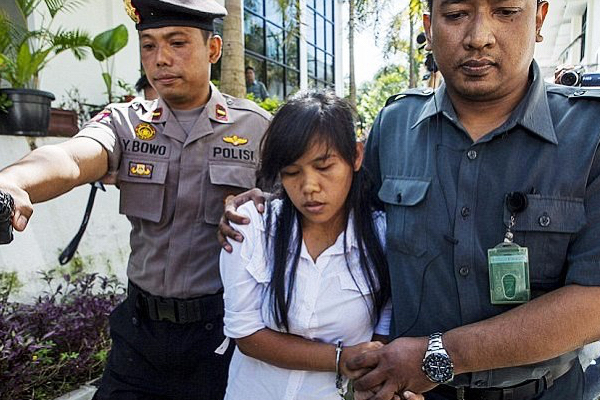In a letter sent this week, the ICJ urged President Joko Widodo to grant Mary Jane Veloso, a Filipino national on death row in Indonesia, a permanent reprieve from execution and to impose a moratorium on executions, with a view of abolishing death penalty in the near future.
In its letter, the ICJ clarifies that executing Mary Jane Veloso for drug trafficking would violate Indonesia’s obligations under the International Covenant on Civil and Political Rights and, in the circumstances of this case, appear to be inconsistent with Indonesia’s laws on trafficking in human beings.
Indonesia’s domestic law on criminalizing trafficking of persons provides that “a victim who commits a crime under coercion of by offender of the criminal act of trafficking in persons shall not be liable to criminal charges.”
The ICJ points out there are allegations that Mary Jane Veloso is a victim of trafficking, and that the crime she was convicted of resulted from such crimes against her.
“Rather than being identified and treated as victims of serious crimes, trafficked persons are often arrested, detained, charged and even prosecuted for being involved in criminal activities committed as a consequence of their situation of having been trafficked,” said Wilder Tayler, ICJ’s Secretary General.
Criminalization of victims of trafficking is directly connected to the fact that governments often fail to identify the victims correctly, the ICJ says.
“What is essential to combating trafficking is the timely identification of victims. The Indonesian government therefore must undertake prompt, thorough, and impartial investigation on the allegations that Mary Jane Veloso is a victim of trafficking,” Tayler added.
The ICJ notes that there is a growing recognition that victims of trafficking should not be prosecuted for offenses relating to their status as trafficking victims.
“Criminalizing victims like Mary Jane Veloso would compound the harm they have already experienced. It would also deny them the rights to which they are entitled,” Tayler said.
The ICJ urges Indonesia to impose a moratorium on executions, with a view to abolishing death penalty in the near future.
By resuming executions in 2013 after a four-year de facto moratorium, Indonesia is defying the global trend towards the abolition of the death penalty and the establishment of a moratorium on execution.
Furthermore, imposing the death penalty for drug-related offenses contravenes Indonesia’s obligations as a party to the International Covenant on Civil and Political Rights (ICCPR), and other international standards, which clarify that states retaining the death penalty must ensure that its application is limited to “the most serious crimes”, the ICJ says.
The ICJ emphasizes that the imposition of the death penalty is a violation of the right to life and the absolute prohibition of torture and other cruel, inhuman or degrading treatment or punishment.
Background:
Mary Jane Veloso was allegedly unlawfully and fraudulently recruited in the Philippines to work as a domestic helper in Malaysia.
Upon her arrival in Malaysia, she allegedly was told by her ‘recruiter’ that she needed to go on an errand and meet the ‘recruiter’s’ friend in Indonesia.
It is alleged that the recruiter gave Mary Jane Veloso the luggage for her to pack her clothes in for her trip to Indonesia.
On 25 April 2010, Mary Jane Veloso was arrested upon her arrival at the airport in Yogyakarta, Indonesia, for possessing 2.6 kilograms of heroin that were found in the seams of the luggage she carried.
Two of Mary Jane Veloso’s alleged traffickers are now in the custody of Philippine authorities and are set to face trial in the Philippines.
Contact:
Sam Zarifi, ICJ Regional Director for Asia and the Pacific, t: +66 80 781 9002 ; e: sam.zarifi(a)icj.org
Indonesia-Letter to president on Death Penalty-Advocacy-2015-ENG (full text of the letter, in PDF)





